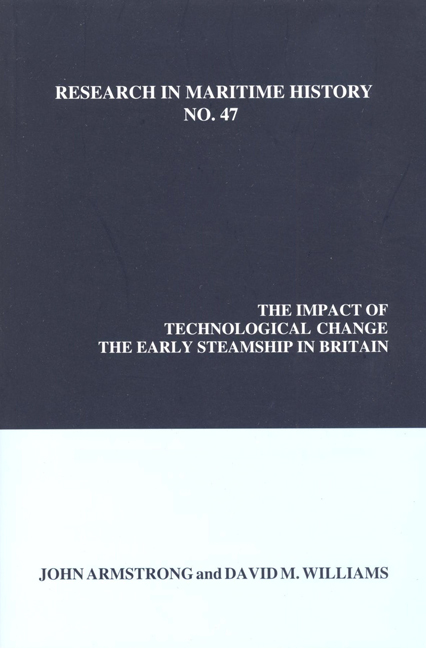Book contents
- Frontmatter
- Contents
- Series Editor's Foreword
- About the Authors
- Introduction
- Chapter 1 British Steam Navigation, 1812 to the 1850s: A Bibliographical and Historiographical Review
- Chapter 2 Some Official Listings of “Vessels Navigated by Steam” in Britain up to 1851: Evidence and Interpretation
- Chapter 3 The Steamboat, Safety and the State: Government Reaction to New Technology in a Period of Laissez-Faire
- Chapter 4 The Steamboat and Popular Tourism
- Chapter 5 The Thames and Recreation, 1815-1840
- Chapter 6 Steam Shipping and the Beginnings of Overseas Tourism: British Travel to North Western Europe, 1820-1850
- Chapter 7 Technological Advance and Innovation: The Diffusion of the Early Steamship in the United Kingdom, 1812-1834
- Chapter 8 The Steamship as an Agent of Modernisation, 1812-1840
- Chapter 9 “A New and Very Modern Business:” The Traffic and Operations of the Early Steamship
- Chapter 10 Promotion, Speculation and Their Outcome: The “Steamship Mania” of 1824-1825
- Chapter 11 The Perception and Understanding of New Technology: A Failed Attempt to Establish Transatlantic Steamship Liner Services, 1824-1828
- Chapter 12 The “Norwich Explosion” of 1817: A Local Tragedy of National Significance
- Chapter 13 Early Steamboat Services and Their Impact in North Wales, 1817-1840s
- Chapter 14 The Beginnings of a New Technology: The Constructors of Early Steamboats, 1812-1822
Chapter 12 - The “Norwich Explosion” of 1817: A Local Tragedy of National Significance
- Frontmatter
- Contents
- Series Editor's Foreword
- About the Authors
- Introduction
- Chapter 1 British Steam Navigation, 1812 to the 1850s: A Bibliographical and Historiographical Review
- Chapter 2 Some Official Listings of “Vessels Navigated by Steam” in Britain up to 1851: Evidence and Interpretation
- Chapter 3 The Steamboat, Safety and the State: Government Reaction to New Technology in a Period of Laissez-Faire
- Chapter 4 The Steamboat and Popular Tourism
- Chapter 5 The Thames and Recreation, 1815-1840
- Chapter 6 Steam Shipping and the Beginnings of Overseas Tourism: British Travel to North Western Europe, 1820-1850
- Chapter 7 Technological Advance and Innovation: The Diffusion of the Early Steamship in the United Kingdom, 1812-1834
- Chapter 8 The Steamship as an Agent of Modernisation, 1812-1840
- Chapter 9 “A New and Very Modern Business:” The Traffic and Operations of the Early Steamship
- Chapter 10 Promotion, Speculation and Their Outcome: The “Steamship Mania” of 1824-1825
- Chapter 11 The Perception and Understanding of New Technology: A Failed Attempt to Establish Transatlantic Steamship Liner Services, 1824-1828
- Chapter 12 The “Norwich Explosion” of 1817: A Local Tragedy of National Significance
- Chapter 13 Early Steamboat Services and Their Impact in North Wales, 1817-1840s
- Chapter 14 The Beginnings of a New Technology: The Constructors of Early Steamboats, 1812-1822
Summary
Good Friday of 1817 was a tragic and momentous day for twenty-two people in Norwich, and for some it was sadly their last. A report in the Norfolk Chronicle and Norwich Gazette, published the following day, recounts the tragedy.
It is our painful task to state the occurrence of a most dreadful and fatal accident, which took place in this city yesterday morning. - About nine o'clock, as Wright's Norwich and Yarmouth steam packet had just started from the Foundry Bridge, the boiler of the engine burst, with a tremendous noise, and, by the irresistible force of the explosion, the vessel was literally blown to atoms. There were, at this unfortunate moment, 18 persons, adults of both sexes and two children, on board. - Of this number, melancholy to add, eight, (five men and three women) were instantaneously killed. Six women, miserably wounded, were immediately conveyed to the Hospital. The remaining six persons, including two children, have, we hope, escaped without sustaining material injury. Every possible assistance was promptly rendered to the survivors by those who happened to be near at the time: and among the most active in these humane exertions, it is due to mention Mr Aggs, opposite whose premises this shocking and deplorable event happened.
The report noted that the names of the victims were as yet unknown, but it was able to state the names and conditions of the six women conveyed to the hospital. They had various injuries. One, Esther Walton aged fifty of Yarmouth, suffered a badly fractured leg which had to be amputated, while Mary Stephen aged thirty-six, also of Yarmouth, with compound fractures, lost both legs. By the time of the paper's next issue, the following Saturday, 12 April, a coroner's inquest had occurred. The jurors’ verdict on the nine fatalities (the original eight had been added to by the discovery of the body of a two-year-old-boy in the river) was “Accidental Death.” The paper listed the names, ages and hometowns of the victims - mostly from Yarmouth and Norwich - including one William Nickerson, the steersman of the vessel. It also provided details of “the persons who providentially escaped,” three young children and four males, the latter including the engineer and the steward of the vessel.
- Type
- Chapter
- Information
- The Impact of Technological ChangeThe Early Steamship In Britain, pp. 245 - 258Publisher: Liverpool University PressPrint publication year: 2011



